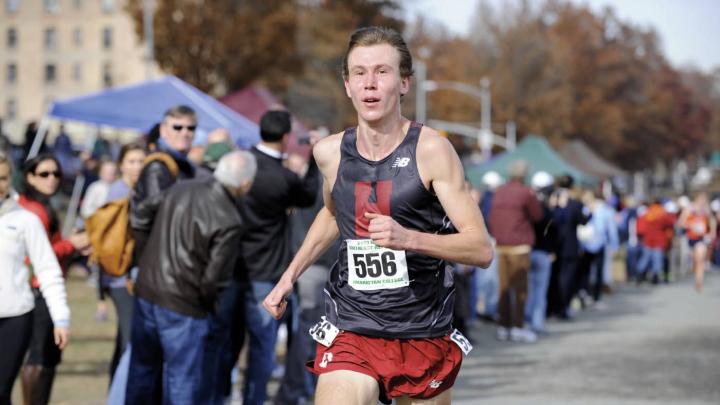When cross-country star Maksim Korolev ’14 was a sophomore, he read a Crimson article in which basketball star Keith Wright ’12 explained why he’d picked Harvard, which had never won an Ivy title, over perennial powerhouse Princeton. When a Princeton coach urged Wright to go there, citing the Tigers’ rich basketball history, Wright replied, “I don’t want to be part of history. I want to make history.”
That declaration mirrored Korolev’s own reasoning. “I really liked [it],” the heavily recruited Missouri all-state runner says now. “And Harvard cross-country and track were real underdogs. Cross-country had been getting very poor results. But they were starting to come around.” For example, Dan Chenoweth ’11 (see “Hotfoot,” November-December 2010, page 69) had just captured Harvard’s first Ivy League cross-country championship in 15 years. “I was excited to be part of that,” Korolev explains.
“Maks,” as his teammates call him, has not only been part of that turnaround but has made some history of his own. Last fall, the Crimson qualified to compete at the NCAA cross-country championships for the first time in 35 years. Korolev finished third overall with a time of 29:59.5 over the 10-kilometer course, the highest such finish in Harvard history. He’d earlier posted an Ivy record time at the fall Heptagonals while winning the conference title on an 8K course.
Indoors, at the Terrier Invitational in Boston in January, Korolev ran the 5K in 13:42.56, shattering the Crimson record of 13:59.35 by nearly 17 seconds. His time was a new Ivy record, more than three seconds below the standard set by Olympian Donn Cabral of Princeton. Then in February, at the Boston University Valentine’s Invitational, Korolev won the 3K run by 0.5 seconds in a time of 7:51.52. That lowered the Harvard record by six seconds, and also set a new Ivy mark. At the indoor NCAA Championships at Albuquerque in March, he placed thirteenth in the nation in the 5K, and fourteenth in the 3K, becoming a Second Team All-American.
Meanwhile, the team as a whole has been coming together and achieving the kind of success Korolev anticipated as a freshman. In March, at this year’s Heptagonal meet (which decides the Ivy indoor track championship), Harvard’s women finished first and the men’s team third, making the Crimson the league’s best combined track-and-field squad. In a photo finish there, Korolev came in second in the 5K, only 0.16 seconds behind his training partner James Leakos ’14, who won in 13:58.67.
Leakos and Korolev like to run together on Sundays, traversing 18 miles, often around Walden Pond in Concord, where exposed roots and uneven dirt terrain offer useful practice in agility, keeping your balance, and staying aware of the footing. Korolev typically trains about 100 miles weekly; head track coach Jason Saretsky forbids him to run more, so Korolev has added some cycling to his regime. “One of the most important things is being consistent,” he says. “You want to train every day and not get injured. Running injuries are usually from repetitive stress, so I run on dirt whenever possible. There’s less impact than on pavement.” He trains year-round, taking a week off around Thanksgiving after cross-country season, and two weeks off in the summer. Since the thousands of impacts are hard on the body, Korolev tries to sleep eight to 10 hours a night to recover. In this, he is going against the grain: “The mentality at Harvard,” he says, “is to get four hours of sleep a night, and try to do too many things throughout the day.”
Distance runners aren’t known for towering height, and at six feet, five inches, Korolev is one of the taller ones. He might have good running genes. Born in Kazakhstan, he is half Russian and half Tatar. On a trip to the old country he took runs with his biological father (his parents divorced when he was two), and found that the older man, with no training at all, could run for an hour alongside him, if not at “Maks” pace. At 160 pounds or less, Korolev himself has minimal bulk to transport; less body weight also softens the physical impact of each footfall.
Korolev came to the United States at age seven with his mother, who sought better opportunities here. They settled in Harrisonville, Missouri, where the boy enjoyed playing soccer. In seventh grade he heard about a sport called cross-country, where “you just run,” he recalls. “For some reason that sounded like fun to me.”
He spoke only Russian until arriving in America, but forgot it all to learn English; Harvard courses have helped him recover much of his first language. Korolev concentrates in human developmental and regenerative biology; he’s been interested in the aging process since high school. He took computer science at Harvard, and likes technology and “tech stuff”; next year he will enroll in an M.S. program at Stanford in management science and engineering (a “techie M.B.A.,” he calls it). “I respect Apple,” he notes, “but I like Android a bit more.” Even more than that, he likes making history.








